Basic guidelines for anyone considering the pursuit of a professional career in herpetology.
In simple terms, herpetology is the study of amphibians and reptiles, and a person who conducts such studies is a herpetologist. Another term to be defined very plainly is “professional.” At its most basic, the word refers to someone who is financially compensated for their services.
Herpetology can provide a very satisfying and fulfilling career, but positions are limited and only available to those willing to work hard in a competitive field. Herein I will lay out some very basic guidelines for anyone considering the pursuit of a professional career in herpetology, as well as some caveats of advice for individuals to better exploit their abilities and talents.
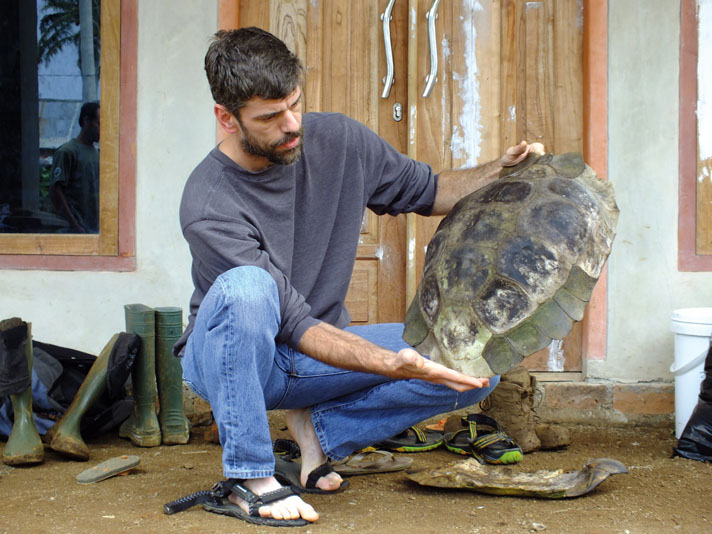
carl franklin
Herpetological collecting expeditions are as thorough as possible, and even shells of turtles and tortoises that were eaten are of scientific value. No one would sacrifice an old tortoise such as the Asian mountain tortoise (Manouria emys) that once inhabited this shell just to put it in a museum, but why allow the tangible remains to go to waste?
To be clear, what follows are not suggestions for someone interested in merely “being involved with amphibians and reptiles.” Instead, it is advice regarding some areas of pursuit for someone who is seriously interested in a career contributing to the science of herpetology. The avenues and routes for establishing a career in this field are not necessarily easy and might not be suited for most people. This is not a trade akin to a skilled labor with a high volume of demand, but one rooted within scientific rigor and with relatively few, often highly coveted, positions for competitive and highly skilled individuals.
A Career With Reptiles
So, who am I to dole out such advice? For starters, I am someone who was very fortunate to have attended the University of Texas at Arlington, which maintains a strong and diverse herpetology program. I was also lucky to live in the Dallas-Fort Worth area, where there are two zoos that maintain critically acclaimed herpetology departments.
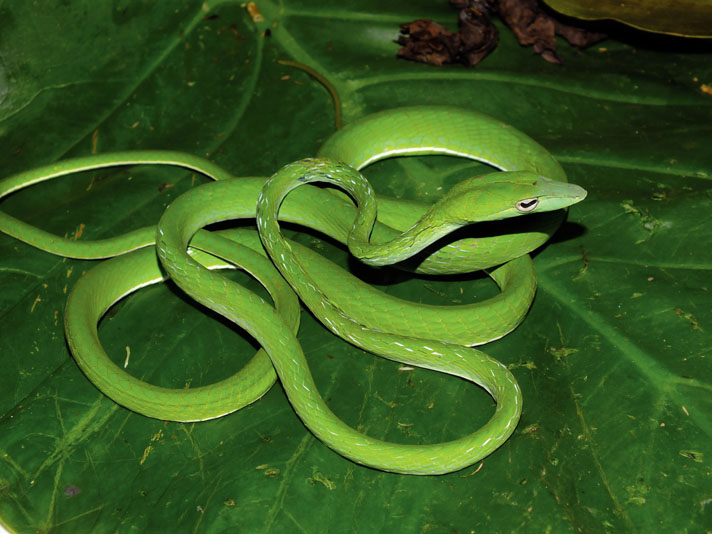
carl franklin
Some species that are common in the pet trade are surprisingly rare in scientific collections, including the Asian vine snake (Ahaetulla prasina).
I began my professional herpetology career as a work study student with the proclamation, “No one can sweep floors better than me!” This led to an opportunity to assist in maintaining a scientific collection in a herpetological museum, which was one of the best things that happened to me. At that time, the program also maintained a diverse live collection of rare reptiles that I later earned the responsibility of maintaining. All of this helped me to later secure my first zoo job as a keeper at the Fort Worth Zoo herpetarium.
Later, due to my experience and recommendations, I attained the position of Research Technician at the Dallas Zoo department of herpetology. Both zoo collections introduced me to something different from the museum, a different range of herpetological experiences, comprehensive experience with herpetoculture and lots opportunities for public outreach education.
While working in the zoo field, I also began exploring, making scientific collecting expeditions to Honduras and helping with survey work in the Amazon basin of Peru. Later, I became a consultant for a serpentarium in Mexico, and throughout, I was giving presentations and talks for various herpetological societies, both amateur and professional. During all these activities, I remained an active contributor to the herpetological collection at the University of Texas at Arlington.
Currently, I am a curator and the collection’s manager of the Amphibian and Reptile Diversity Research Center at the University of Texas at Arlington, and I can honestly say that I have thoroughly enjoyed my entire career. And one of the things I want to provide to the rabid and salivating nerds with an obsession for all things herpetological is a general idea of how they, too, can prepare for a career in such a challenging and fascinating profession. Overall, one can expect a lot of work and a middle-class income, but a proud distinction among many herpetologist is that our stories are often more interesting than those of the rich!
Education and Research in Herpetology
Getting right to the point, an education beyond a bachelor’s degree will give you an enormous advantage in becoming a herpetologist. And for more bad news: Grades matter, and developing good academic habits will greatly enhance your chances of success not only for being accepted into a graduate program, but performing well while there.
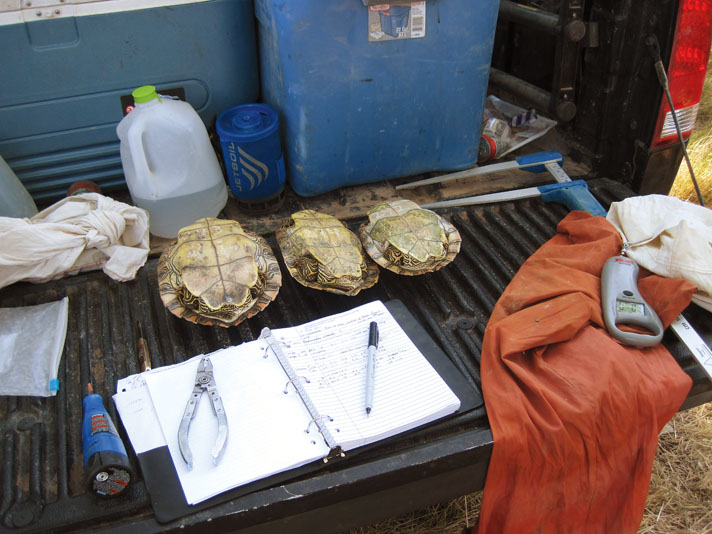
carl franklin
Participating in field work such as mark-and-recapture studies pertaining to turtles is a sheer joy — especially when recaptures are made, as there is the reunion component combined with learning more about a turtle’s life history.
Most herpetologists have a strong educational background in the life sciences, particularly biology, ecology and zoology. Because there is no specific degree program for herpetology, this type of educational background is very useful for future academic efforts that are more specific to herpetology.
Several factors come into play when considering which college or university to attend, including admissions, cost, faculty and location. Developing good academic habits are essential, as they lead to good grades. Herpetology is a very competitive field and having good grades and a disciplined approach to coursework will greatly enhance one’s options for selecting a graduate program that is best for them.
Here’s a useful tip: Contact herpetologists at universities and colleges directly, and ask them about the direction their research is going, their academic program, and the necessary requirements to be officially accepted in their labs. (Some labs have a more specific focus on herpetological research than others.)
Another advantage to having good grades is that they can literally pay off. Most university programs provide financial support for full time graduate students in the form of a salary and, in some instances, the support can even include waiving the cost of tuition. In these situations, graduate students either qualify for a TA (teaching assistant) or RA (research assistant) position.
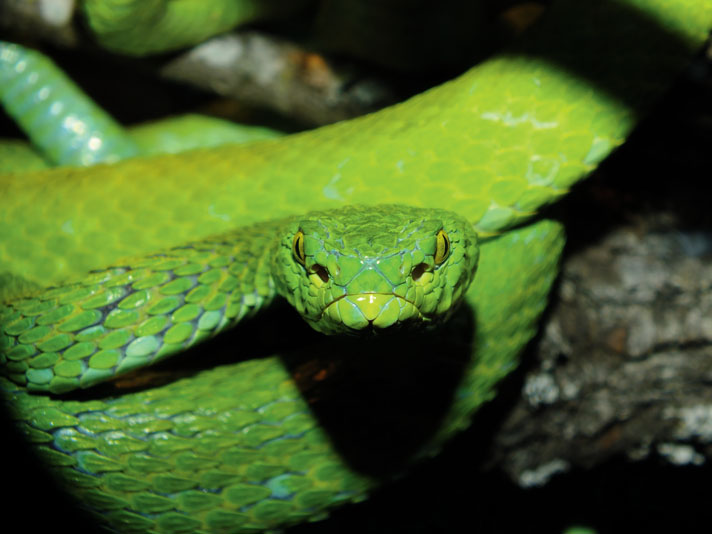
carl franklin
This Mexican palm viper (Bothriechis rowleyi) is an example of a species collected by herpetologists and maintained and reproduced in captivity for decades. The founders for this specimen were collected in southern Mexico and placed on loan to the San Antonio Zoo.
Teaching assistant positions require the teaching of courses or the labs affiliated with a course, along with necessary coursework and research obligations. Research assistant positions are the more challenging of the two to acquire; they don’t require the teaching component, but instead involve assisting with ongoing research or the synthesis of new research projects while completing necessary coursework.
Graduate courses are more focused for aspiring herpetologists than general undergraduate classes. Biogeography, conservation biology, herpetology, genetics and wildlife conservation are topics often provided as courses for graduate students, and many times, they are taught by a herpetologist. Aside from providing a fantastic education, universities are the places that drive and generate innovation and research while presenting some amazing opportunities to the intrepid student.
So, which university should you consider for the most bang-for-the-buck opportunities in herpetology? A university with full time herpetologist(s) as faculty should be considered first. Also choose one with an affiliated research museum collection of amphibians and reptiles. Universities with active research collections not only use them to buttress their own research endeavors, but also to assist other researchers from other institutions, both domestic and international. Collection-based programs will hands-down provide the most in-depth educational resources and research opportunities. They are also the institutions that will have a greater likelihood of securing the necessary funding for research that is high-impact, exciting and even groundbreaking.
Simply put, a university education will prepare you for so many things, and the right university can directly prepare you with lots of information and learning experiences that would be unattainable otherwise. Climbing the academic ladder provides a very real and solid means to develop competency with scientific application, critical thinking and an understanding on how to synthesize ideas.
Upon the completion of a master’s degree, some may continue onward to pursue a doctoral degree, which encompasses more detailed application toward research and the development of ideas. After completion of a Ph.D. program, some may round off their educational pursuit with a post-doctoral research position at a university or institution. This level of academic occupation often allows the individual a higher amount of competitiveness in the academic profession and research-oriented positions.
Current studies in the field of herpetology are wide ranging, and various faculty advisors maintain different laboratories, each with unique research efforts. A student preparing to continue an advanced degree for herpetological studies should contact potential academic advisors and find out the areas of research in which they are currently invested. Also communicate with the potential advisor some thoughts you might have regarding your interest. If you are concerned that your interest might be better utilized in another lab, ask if they happen to have a colleague with research in that area.
Ultimately, many people who are successful in establishing a career in academic herpetology wind up mentoring students, who then carry the torch and, eventually, begin their own research programs that, in turn, inspire a new generation of herpetologists.
All in all, academic herpetology is highly competitive but wonderfully rewarding for anyone with a desire and passion to explore these amazing animals in a scientific capacity.
Involvement and Opportunities in Herpetology
There is a direct relationship between the likelihood of being successful and the amount of involvement one has for this discipline, and volunteerism is a viable way to gain direct knowledge and insight into professional herpetology.
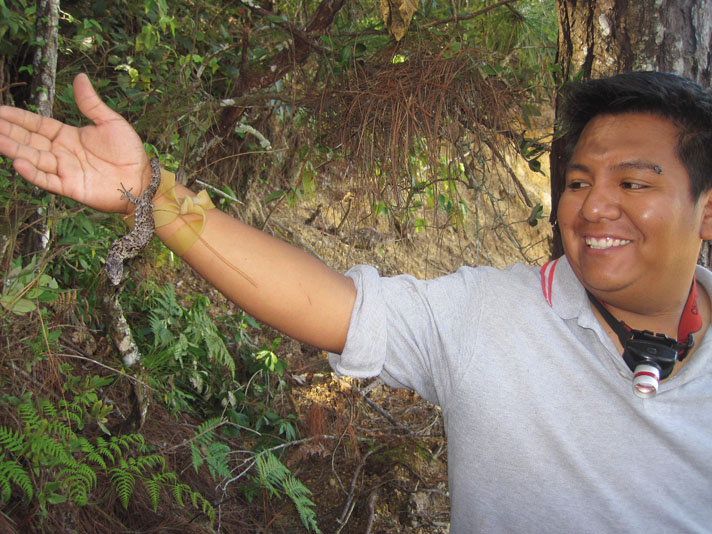
carl franklin
In 2012, the author’s friend, Oscar Olivares, came across this specimen of Mexican alligator lizard in Oaxaca, Mexico. It turned out to be a new species, Abronia cuetzpali, which is known from only three specimens.
Museums will often accommodate serious volunteers, and some universities allow course credit to be provided in such instances. Zoos have established programs for volunteers, and their duties and responsibilities often vary depending upon demonstrated competencies or expressed preferences. The tasks assigned to volunteers may sometimes fall into the “grunt” category because they are usually the basic yet necessary chores that all of us had to do, or still do! I mention this in case people reading this article later volunteer at a zoo herpetarium and wonder why they are asked to clean crickets!
Today, many zoos have moved beyond being amusement parks with caged animals to institutions that are making valuable efforts regarding conservation biology. Amphibians and reptiles are the focus of many, which has led a number of zoos to create conservation biologist positions for individuals with a doctoral degree as a prerequisite.
In response to better utilizing zoo resources in contributing to the complexities of the work involved, a Ph.D. can be required for some curatorial positions. In some zoos, a bachelor’s degree is required for an entry-level position. I have worked at two zoos; I was a keeper at the Fort Worth Zoo herpetarium, and then later a research technician for the Dallas Zoo department of herpetology. One of my duties, aside from caring for a wide range of species and creating and managing exhibits, was having a paper published in at least one peer-reviewed publication each year.
Some of the herpetological conservation/research areas that zoo herpetologists are contributing to include (but are not limited to): Caribbean iguana conservation, global amphibian declines, crocodilian conservation, and the ever-present crisis being faced by turtles.
A solid background in herpetocultural husbandry and the captive breeding of reptiles works hand-in-hand with these positions, as some of the species involved have their progeny reintroduced to the wild. For others, being released into the wild is not an option, and the live specimens are managed within assurance colonies so that the species at least remain extant even when their natural ranges have been destroyed or severely altered.
We cannot give up hope for the existence of species diversity, and the forces working on the front lines of amphibian and reptile conservation are comprised of herpetologists.
Herpetological Societies
There is a wide range of regional herpetological societies available for those with a casual interest in herpetology to be a part of. There are also professional societies that cultivate and publish research findings of academic herpetologists, and I encourage anyone interested in developing a career in herpetology to become involved with both types.
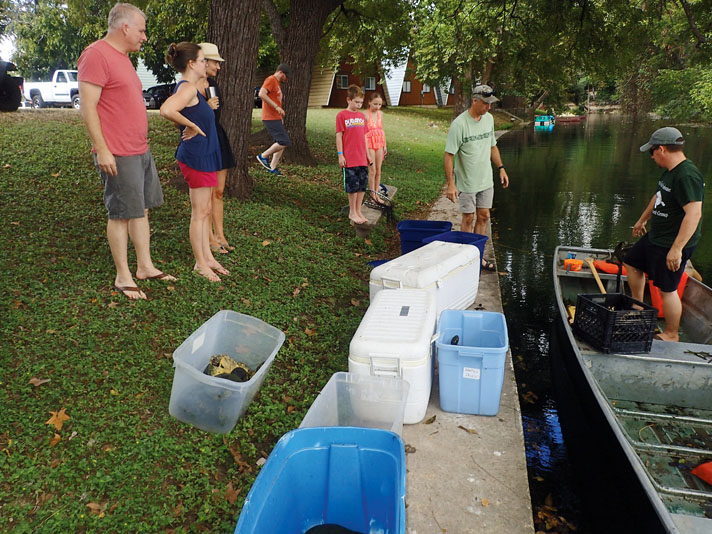
carl franklin
Although reptiles are sometimes ostracized and often misunderstood, herpetologists meeting with the general public usually results in interesting and stimulating conversations that, hopefully, captivate and inspire young people to consider herpetology as a profession.
The benefits can be significant. Both will provide a platform for making new contacts that can be invaluable later on, as well as provide solid ideas for what’s required to undertake research. Also, some amateur herpetological societies provide modest research grants for the serious amateur investigator. Some herpetologists gain their first experiences in grant writing in this way.
With the advent of social media and online interest groups, overall attendance for regional herp societies has declined. In spite of this, I encourage anyone wanting to broaden their scope in preparing for a career in herpetology to attend these in-person meetings. A face-to-face meeting carries so much more weight and enhances communication much better than any form of online messaging.
Regional herp societies are also good places for aspiring herpetologists to develop their public speaking skills. Public speaking is something that a lot of people fear. If this applies to you, just know that when giving a herpetological presentation, at least the subject matter is on your side! Public speaking and effective communication are vital skills for herpetologists, and the sooner you develop both, the better.
Go For a Career in Herpetology
The ideas and suggestions presented in this article encompass the general route I and most of my fellow herpetologists took to establish our careers in herpetology. But in no way do they represent the only path or places where a herpetologist can gain employment. State wildlife agencies, environmental consulting firms and nature centers, to name a few, are other potential places of employment.
Possibly the best advice I can provide to a young person unencumbered with some of the life-related obligations faced by older people is to use your youth. Go for it full blast, and don’t be afraid of your herpetological obsession. Having an obsession can often translate to an increased likelihood of success and happiness!
Carl Franklin is the curator and collection’s manager of the Amphibian and Reptile Diversity Research Center at the University of Texas at Arlington. Readers with any questions regarding potential careers (as well as caveats) in herpetology may email him at Franklin@uta.edu.


